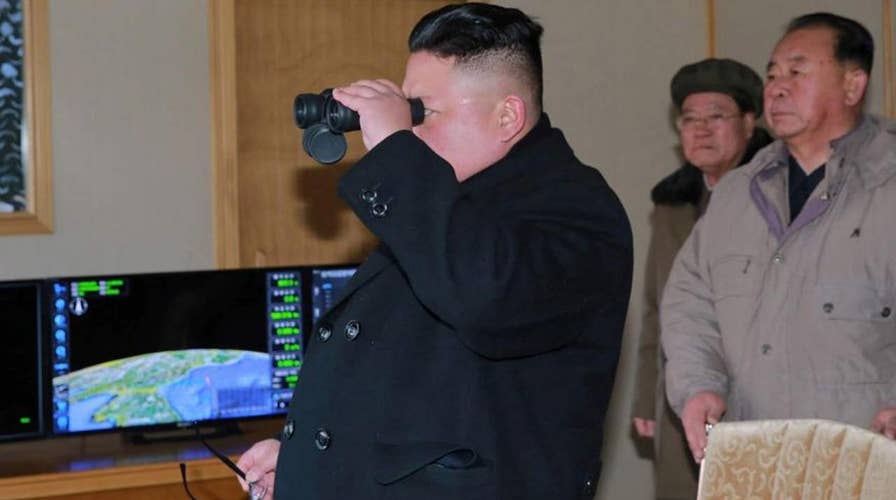US waging secret effort against North Korea missile program
Insight from New York Times national security correspondent David Sanger
North Korea’s recent missile tests will put new pressure on the Trump administration to choose a strategy for dealing with this pesky proliferator.
The standard playbook is well known to those who have worked on the problem of North Korea: pressure China to pressure North Korea, toughen sanctions, reassure allies and push them to build missile defenses. Mr. Trump can follow this well-worn path, but he will likely get the same result: failure.
Instead, Mr. Trump, simply by virtue of being the new president, has another option. He can talk to the North Koreans and negotiate. North Korean officials have said that they are willing to turn the page and start fresh with President Trump. If he is open, they would be open. Or so they say.
What would that even look like?
One clue is to be found in a former Director of National Intelligence Clapper’s public remarks on North Korea. He suggested it might be possible to “cap” the North’s programs. A freeze or a cap might then evolve to another stage, if the cap was successful. But getting a freeze on the Pyongyang’s weapons programs will require two things: fresh thinking and artful negotiation.
As someone who has sat across the table from North Korean officials in Pyongyang discussing nuclear weapons, I can tell you it won't be easy. There will be challenges, potential pitfalls, and domestic critics – the same obstacles that Ronald Regan faced when his government negotiated with the Soviets.
Of course, it takes two to tango. Are the North Korean’s ready to dance? Perhaps.
Chairman Kim previously floated the idea that he would freeze some of its weapons tests, if the U.S. called off its joint military exercises with South Korea.
More recently, Pyongyang suggested that it would normalize relations, if the U.S. withdrew its troops from the South. Both offers are complete and utter non-starters.
But here’s the thing: they are offers.
Negotiations start with offers, and rarely does the first offer represent the final deal.
Any negotiation would require that the U.S., South Korea, and Japan to all be on the same page. Our treaty allies have to know that Washington would never agree to anything that would disadvantage them, and that common security interests would be the bedrock of any agreement.
If Mr. Trump were successful, he will have reversed years of failed attempts by the Washington establishment -- Republicans and Democrats alike-- to stop progress in the North’s weapons programs.
That the maverick president might deliver a North Korea deal is certainly irony. Former Secretary of State Hillary Clinton, the nation’s top diplomat, did not negotiate with North Korea on her watch, and she would probably not have negotiated an agreement had she won the election.
Clinton is alleged, in a hacked campaign email, to have threatened to “ring China with missile defenses” in order to pressure China to “control” the Kim regime.
The email, if authentic, suggests a policy that is plainly flawed. Beijing does not “control” Pyongyang, though it wishes it could. North Korea has repeatedly conducted nuclear tests over and against China’s objections.
It also misreads China’s likely reaction. Facing a ring of missile defenses (our missiles aimed at their missiles), and with no guarantee that they would be withdrawn even with a tamed North Korea, China will respond by building more of its own missiles. In short, it would precipitate an arms race.
The other pillar of a Clinton pressure policy would have been more sanctions on North Korea. As a new U.N. report on North Korean procure points out, Pyongyang continues to employ a variety of evasion techniques that enable them to sidestep the sanctions.
The conclusion is consistent with a study I authored with my colleague John Park from Harvard University. Our study interviewed North Korean defectors and found that “North Korea, Inc.,” has innovated, and some cases even flourished, in the face of sanctions.
The president has the freedom to pursue a new direction. He should not squander this opportunity.
If he passes on negotiations, and things go badly, he may not get another chance.
He should test the North Koreans to see if they are serious about negotiations.
Every negotiation entails risk, and there will be plenty of naysayers. It is always easier to do more of the same, but it is this very policy that has brought us to this point.
Mr. Trump could change the course of events on the Korean peninsula and make the world a safer place.
If he doesn’t, his presidency may well be defined by that failure.
The moment has arrived for the art of the deal.





















